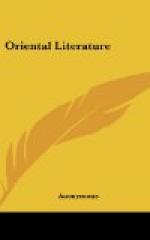ARABIAN POETRY
Introduction SELECTIONS.— An Elegy The Tomb of Mano Tomb of Sayid On the Death of His Mistress On Avarice The Battle of Sabla Verses to My Enemies On His Friends On Temper The Song of Maisuna To My Father On Fatalism To the Caliph Harun-al-Rashid Lines to Harun and Yahia The Ruin of Barmecides To Taher Ben Hosien The Adieu To My Mistress To a Female Cup-bearer Mashdud on the Monks of Khabbet Rakeek to His Female Companions Dialogue by Rais To a Lady Weeping On a Valetudinarian On a Miser To Cassim Obio Allah A Friend’s Birthday To a Cat An Epigram upon Ebn Naphta-Wah Fire To a Lady Blushing On the Vicissitudes of Life To a Dove On a Thunder Storm To My Favorite Mistress Crucifixion of Ebn Bakiah Caprices of Fortune On Life Extempore Verses On the Death of a Son To Leila On Moderation in our Pleasures The Vale of Bozaa To Adversity On the Incompatibility of Pride and True Glory The Death of Nedham Almolk Lines to a Lover Verses to My Daughters Serenade to My Sleeping Mistress The Inconsistent The Capture of Jerusalem To a Lady An Epigram On a Little Man with a Very Large Beard Lamiat Alajem To Youth On Love A Remonstrance with a Drunkard Verses On Procrastination The Early Death of Abou Alhassan Aly The Interview
ARABIAN NIGHTS
The seven voyages of Sindbad
First Voyage
Second Voyage
Third Voyage
Fourth Voyage
Fifth Voyage
Sixth Voyage
Seventh and Last Voyage
Aladdin’s wonderful lamp
THE ROMANCE OF ANTAR
[Translation by Etienne Delecluse and Epiphanius Wilson]
INTRODUCTION
The romantic figure of Antar, or Antarah, takes the same place in Arabian literature as that of Achilles among the Greeks. The Cid in Spain, Orlando in Italy, and Arthur in England, are similar examples of national ideals put forth by poets and romance writers as embodiments of a certain half-mythic age of chivalry, when personal valor, prudence, generosity, and high feeling gave the warrior an admitted preeminence among his fellows. The literature of Arabia is indeed rich in novels and tales. The “Thousand and One Nights” is of world-wide reputation, but the “Romance of Antar” is much less artificial, more expressive of high moral principles, and certainly superior in literary style to the fantastic recitals of the coffee house and bazaar, in which Sinbad and Morgiana figure. A true picture of Bedouin society, in the centuries before Mohammed had conquered the Arabian peninsula, is given us in the charming episodes of Antar. We see the encampments of the tribe, the camels yielding milk and flesh for food, the women friends and councillors of their husbands, the boys inured to arms from early days, the careful




